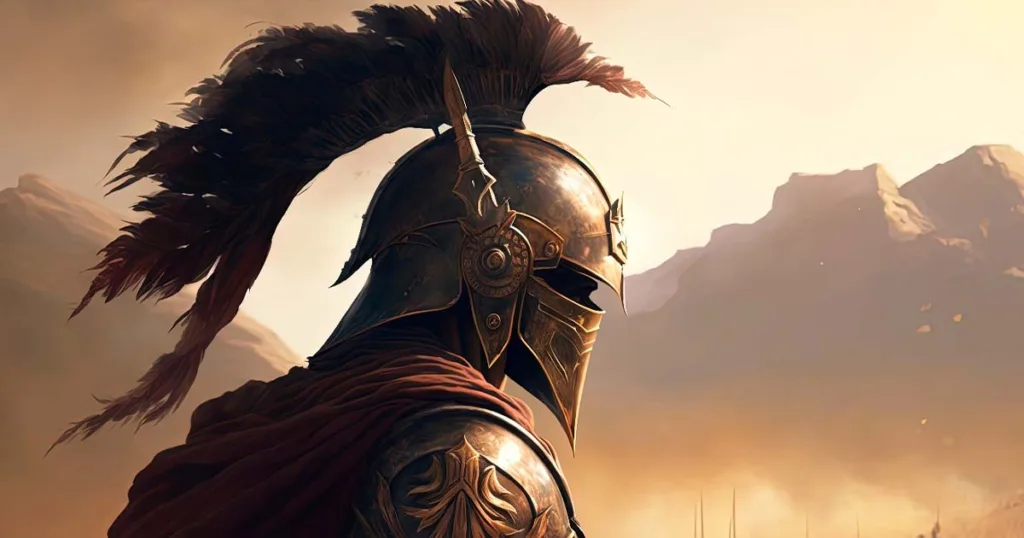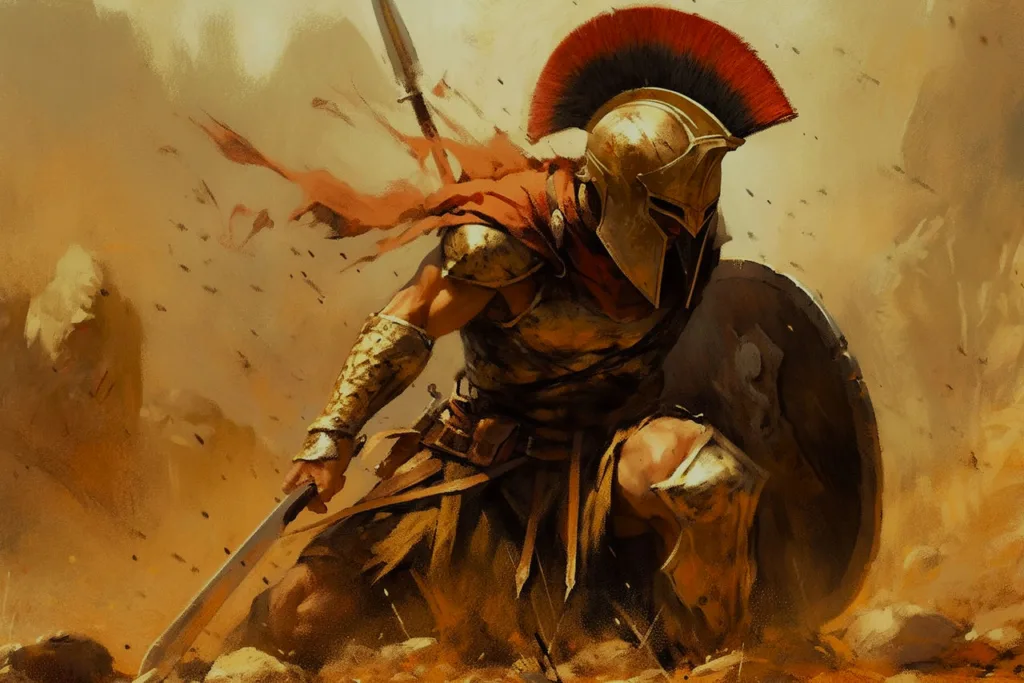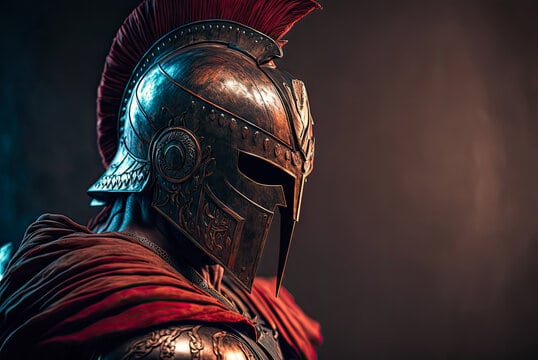In the annals of historic records the Spartan warriors stand out as paragons of discipline, courage, and navy prowess. Known for their rigorous coaching and unwavering dedication to the artwork of struggle it is effortless to envision these troopers as stern and unyielding. However,even the most formidable warriors sought respite from the battlefield. In this exploration The Forbes Daily delves into the intriguing question: What did Spartan soldiers do for fun in war camps?

Athletic Competitions: A Test of Skill and Camaraderie
Contrary to popular belief, Spartan soldiers engaged in more than just combat training. The war camps witnessed the unfolding of various athletic competitions that served as both entertainment and a means of honing physical prowess. Races, wrestling matches, and discus throwing were common occurrences, fostering a spirit of healthy competition and camaraderie among the soldiers.
Intellectual Pursuits: Mind over Matter
While renowned for their physical strength, Spartans also valued intellectual pursuits. In war camps, soldiers engaged in stimulating conversations, debates, and strategic planning sessions. The exchange of ideas and tactical discussions not only provided mental stimulation but also reinforced the notion that a sharp mind was as crucial as a strong body on the battlefield.
Music and Dance: Finding Harmony Amidst Chaos
In the midst of the harsh realities of war, Spartan soldiers sought solace in the beauty of music and dance. Musicians and dancers were often part of the war camps, providing a welcome reprieve from the relentless training and battles. The rhythmic beats of drums and the melodies of lyres created an atmosphere of unity and helped soldiers connect with their more human side.
Board Games and Strategy: War on a Different Front
Board games, particularly strategic ones, found a place in the leisure activities of Spartan soldiers. Games like Petteia, a tactical board game similar to chess, allowed warriors to hone their strategic thinking in a different context. These games provided mental stimulation and a chance for soldiers to unwind without losing sight of their commitment to excellence.
Storytelling and Mythology: Nurturing the Soul
In the evenings around the campfire, Spartan soldiers shared stories of valor, mythology, and epic battles. These storytelling classes served no longer solely as a shape of leisure however additionally as a way to skip down the wealthy cultural and historic heritage of Sparta. The troopers observed proposal in the memories of heroes from the past, strengthening their unravel to grow to be legends in their very own right.

Festivals and Celebrations: Balancing the Grueling Reality
Spartans recognized the importance of celebrating life amid the rigors of war. Festivals and special occasions were marked with feasts, music, and communal activities. These moments of revelry served as a vital counterbalance to the harshness of the battlefield, fostering a sense of community and shared identity among the soldiers.
FAQs
What is “Spartans War Cry”?
Spartans’ War Cry:
The Spartans were renowned for their distinctive war cry known as the “Lakedaemonian Battle Hymn” or “Paean.” This war cry was a rhythmic chant that the Spartans would perform as they marched into battle. The purpose of the war cry was to boost morale, intimidate enemies, and create a sense of unity among the Spartan warriors. The specific words of the chant are not known, as they were considered a closely guarded military secret. The power of the war cry was not just in the words but also in the synchronized and disciplined manner in which it was delivered.
What was the extent of the Spartan empire?
Extent of the Spartan Empire:
Unlike some other ancient Greek city states Sparta did not focus extensively on building a vast territorial empire. Instead Sparta’s strength lay in its powerful army and strict social structure. The Spartans did establish a form of hegemony over the Peloponnesian League a coalition of city states in the southern part of Greece, with Sparta being the dominant force. However this hegemony was more about military control and influence rather than territorial expansion. Sparta’s power reached its zenith after the Peloponnesian War but gradually declined in the 4th century BCE.
Could the Spartans have ever been a good Roman legion?
Spartans as a Roman Legion:
The Spartans and Romans were distinct cultures with different military doctrines and societal structures. While both were renowned for their military prowess, the Spartans were more focused on infantry and a citizen-soldier model, emphasizing discipline and excellence in battle. On the other hand, the Roman legions had a more flexible military structure, incorporating a variety of troops and strategies.
The Spartans’ rigid social structure and emphasis on a small, elite warrior class might not have seamlessly integrated into the Roman legion system, which was more inclusive and adaptable. Additionally, the Romans placed importance on engineering, siege warfare, and a professional standing army, aspects that differed from Spartan military traditions. While individual Spartan warriors could have been formidable in a Roman legion, the overall Spartan system might not have aligned well with the broader Roman military strategy.

Who would win between 300 Spartans and 300 Marines?
300 Spartans vs. 300 Marines:
Comparing hypothetical scenarios involving historical groups from different time periods and military contexts is challenging and speculative. The Spartans, as ancient warriors, fought in a style and with weaponry vastly different from modern Marines. The outcome of such a confrontation would depend on various factors, including terrain, tactics, and technology.
Modern Marines are equipped with advanced firearms, artillery, and tactical strategies that give them a significant technological advantage. The Spartans, however, were highly disciplined and skilled in close-quarters combat with their iconic hoplite formation and bronze weapons. In an open battlefield scenario, the Marines’ firepower might give them the upper hand. However, in a confined space that negates the Marines’ technological advantage, the Spartans’ expertise in hand-to-hand combat could prove formidable.
Ultimately, such a hypothetical battle is speculative and depends on numerous variables. Each group excelled in its own historical context, and direct comparisons across millennia are challenging to make with certainty.
In the unforgiving world of Spartan warfare, the soldiers’ quest for entertainment and moments of respite from the relentless training and battles speaks to the universal human need for balance. Far from being mere war machines, Spartan soldiers embraced a multifaceted approach to life in the war camps, engaging in activities that nourished their bodies, minds, and souls. As The Forbes Daily sheds light on this lesser-known aspect of Spartan life, we come to understand that even in the heart of war, the pursuit of joy, camaraderie, and personal growth remained integral to the Spartan ethos.
[…] Physical training was a constant in Spartan military life, even within the war camps. Soldiers engaged in rigorous exercises and combat drills to keep themselves in prime fighting condition. These drills not only sharpened their combat skills but also served as a form of recreation, reinforcing their camaraderie and unity as a unit. […]
daxktilogibigibi.SeK76zuRdWaS
xyandanxvurulmus.AbLPqEcWJXSQ
xbunedirloooo.9s5KpveLbD1K
calver xyandanxvurulmus.gMixYjyj7w92
etherization xyandanxvurulmus.4mbL794xOBqk
sexax vurgunyedim.514pJx6eYfc8
craft porn yaralandinmieycan.0NkgTLdtM93P
anal siteleri citixx.cLJsVDxm44vq
amciik siteleri hyuqgzhqt.iPLHGQh0Z8XM
fuck google ewrjghsdfaa.VFsTNGLDYEmX
childrens sex wrtgdfgdfgdqq.9eIhizMIkkfn
porn sex wrtgdfgdfgdqq.NgC3QDwfXDaN
🚀 Wow, blog ini seperti petualangan fantastis meluncur ke galaksi dari kegembiraan! 🎢 Konten yang mengagumkan di sini adalah perjalanan rollercoaster yang mendebarkan bagi imajinasi, memicu kegembiraan setiap saat. 🌟 Baik itu inspirasi, blog ini adalah harta karun wawasan yang inspiratif! #KemungkinanTanpaBatas Berangkat ke dalam perjalanan kosmik ini dari penemuan dan biarkan imajinasi Anda melayang! 🌈 Jangan hanya mengeksplorasi, alami kegembiraan ini! #MelampauiBiasa Pikiran Anda akan berterima kasih untuk perjalanan mendebarkan ini melalui alam keajaiban yang menakjubkan! ✨
you are in reality a just right webmaster The site loading velocity is incredible It seems that you are doing any unique trick In addition The contents are masterwork you have performed a wonderful task on this topic
porno izle hepxhupx.THlLik4uVqx3
bahis siteleri porn sex incest juljulfbi.L2DE2FzUQvyG
watch porn video bjluajszz.XGwrn4piRvYJ
porno siteleri bxjluajsxzz.ZYhWqrVsMEL9
fuck google 0qbxjluaxcxjsxzz.3RViBZIFugsv
sexx pokkerx.zM4n7Ohozzi1
porn sex footballxx.VUhJ6LhnqSFT
seksi siteler mobileidn.Sv2b6N5uzakY
viagra bingoxx.ODTZ7cnJAG3S
seks siteleri 250tldenemebonusuxx.im0e9uVmKiyd
house porn eyeconartxx.M56gnDhcOlBj
anal sikis siteleri vvsetohimalxxvc.s5zlkOYVJwE9
eskort siteleri tthighereduhryyy.AmEOzH5u0iG
Incredible, you’ve done an outstanding job this time! Your effort and creativity are truly commendable of this piece. I felt compelled to express my thanks for sharing such fantastic content with us. Your dedication and talent are truly remarkable. Keep up the excellent work! 🌟👏👍
Oh my goodness, you’ve truly surpassed expectations this time! Your commitment to excellence is evident in every aspect of this piece. I couldn’t help but express my appreciation for producing such awesome content with us. Your talent and dedication are truly exceptional. Keep up the awesome work! 🌟👏👍
hd homemade porn gghkyogg.Gcu1OqsXzzi
hd porn free ggjennifegg.XICg8U1u5OG
hd porn download.com ggjinnysflogg.QT4QIYyDN3v
nice content!nice history!! boba 😀
wow, amazing
wow, amazing
fashionflag download porn in 4k fashionflag.kxQc6rOsDfK
goodhere Cunnilingus porn vurucutewet.PXy82HphvmG
ladyandtherose Latina porn backlinkseox.WAMZBsQ2vqS
समलैंगिक अश्लीलता के बारे में बतावल गइल बा hjkvbasdfzxzz.Mx0HVAg34nK
श्वेत-श्याम अश्लीलता txechdyzxca.p0X7Qnn5k3Y
तिकड़ी अश्लील hkyonet.sCxRi3EpWFg
ਰੂਸੀ ਪੋਰਨੋਗ੍ਰਾਫੀ madisonivysex.VEYVSduLgtq
ladesbet ਈਬੋਨੀ ਪੋਰਨ ladesinemi.DpWAf8LarFI
ladesbet フェラチオポルノ ladestinemi.CbBx8pyL55c
Wow, superb weblog layout! How lengthy have you been running a blog for?
you made running a blog look easy. The overall look of your website is magnificent, let alone the content!
You can see similar here sklep internetowy
Excellent write-up
I love your blog.. very nice colors & theme. Did you create this website yourself? Plz reply back as I’m looking to create my own blog and would like to know wheere u got this from. thanks
child porn
child porn
child porn
child teen
child teen
porn
porn
matadorbet porn
matadorbet porn
matadorbet porn
There is definately a lot to find out about this subject. I like all the points you made
Good post! We will be linking to this particularly great post on our site. Keep up the great writing
I’m often to blogging and i really appreciate your content. The article has actually peaks my interest. I’m going to bookmark your web site and maintain checking for brand spanking new information.
I am truly thankful to the owner of this web site who has shared this fantastic piece of writing at at this place.
I really like reading through a post that can make men and women think. Also, thank you for allowing me to comment!
tipobet porn
tipobet porn